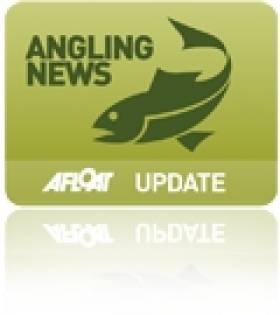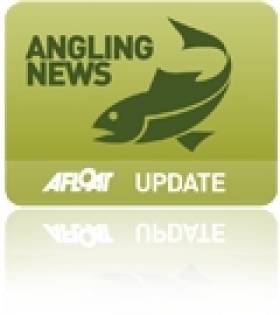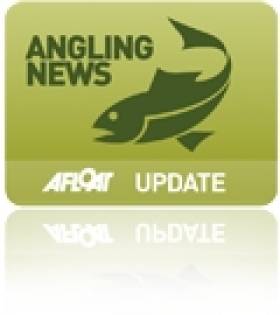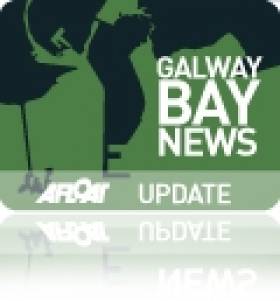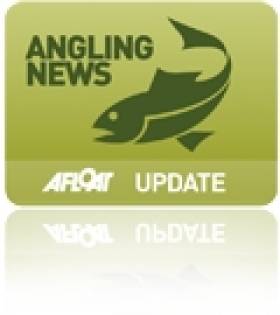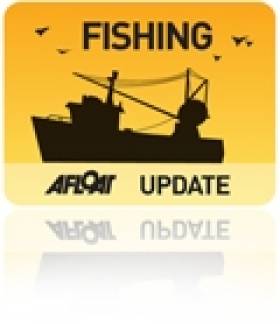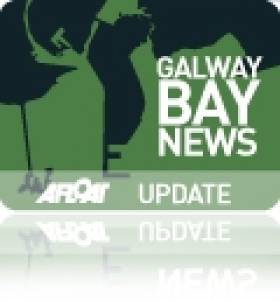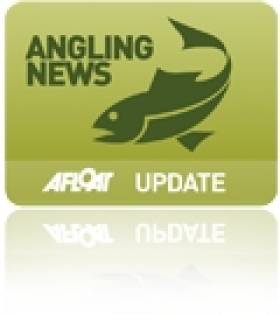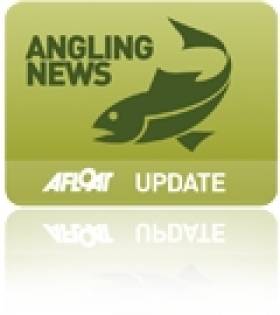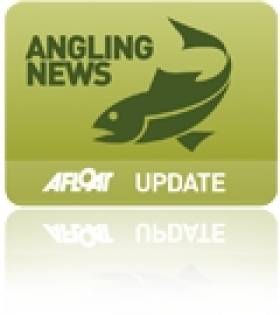Displaying items by tag: Salmon
New Regulations For Salmon Anglers As Season Begins
#Angling - The Irish Times' angling correspondent Derek Evans welcomes the start of the salmon angling season tomorrow with a look at regulation changes for 2013.
Among them he notes that the number of open fisheries has risen to 55, while 59 rivers - five fewer than last year - will be closed, which marks some progress in Inland Fisheries Ireland's (IFI) efforts to ensure sustainability of Ireland's freshwater fish stocks.
Meanwhile, the catch and release programme has been modified to encompass the River Liffey from Islandbridge to Leixlip Dam for the first time, although at 32 the scheme includes two fewer rivers than last year.
"Catch and release will maintain, among other things, club membership interest and ensure a good footfall on the riverbank," writes Evans.
"Provided catch and release protocols are practised correctly, research has shown that the survival rate can be close to 100 per cent."
The Irish Times has more on the story HERE.
Major Conference on Atlantic Salmon Stocking Announced
#Angling - The Atlantic Salmon Trust will team with IBIS (Integrated Aquatic Resources Management Between Ireland, Northern Ireland and Scotland) to host a major conference at the Marriott Hotel in Glasgow on 27-28 November 2013.
Leading speakers will be invited to discuss all aspects of salmon stocking at the conference, titled 'Boosting salmon numbers: is stocking the answer or the problem?'
Over two days, the conference will examine in depth the potential role of stocking in restoring, sustaining and enhancing salmon populations and fisheries.
In a statement, IBIS said: "We are bringing together experts on salmon science and management - including those with direct experience of stocking - to join with anglers and fishery managers in exploring the potential for salmon stocking, including its effectiveness and risks.
"We'll look at such issues as: How does stocking affect numbers of returning adults? Is it cost effective? What is the role of genetics and climate change?
The presentations will range from the underlying science to case studies and examples of best practice."
The conference is fully financially supported by IBIS. Attendees will only be asked to pay for their own travel and hotel costs, and the conference dinner if attending.
Full details of agenda, speakers and how to register will be available in the New Year by sending an e-mail to [email protected].
IFI Repeats Concerns Over Aran Islands Fish Farm
#Angling - Anglers on the River Feale in Kerry and Limerick have been assured by Inland Fisheries Ireland (IFI) that it supports their concerns over the proposed deep-sea fish farm in Galway Bay, as the Limerick Leader reports.
Local anglers are among those throughout the region who have rallied in opposition to plans for the Aran Islands fish farm project, over fears that it would lead to “an explosion” in parasitic sea lice which would prey on wild inland salmon from Irish rivers feeding in the North Atlantic.
IFI reiterated its statement issued last month in which its board said it does not believe "that the corpus of peer reviewed international scientific literature which recognises the negative impacts of sea lice on salmonids have been adequately dealt with" in the Environmental Impact Statement prepared by Bord Iascaigh Mhara (BIM) as part of the public consultation process.
A spokesperson for IFI told the Limerick Leader that the authority has "major concerns about the location and scale [of the farm], as well as its potential impact on sea life. [IFI] is not supporting it in its current form.”
Earlier this month the National Inland Fisheries Forum also criticised as "flawed" the consent process regarding the 15,000-tonne organic salmon farm planned off Inis Oirr, which would be the largest of its kind in Europe.
If approved, the operation could more than double Ireland's current production rate of farmed salmon.
The Limerick Leader has much more on the story HERE.
Groups To Protest Marine Minister's Office Over Galway Bay Salmon Farm
#FishFarm - A group opposed to the Galway Bay deep-sea salmon farm proposals has announced it will protest the constituency office of Marine Minister Simon Coveney this Saturday 15 December.
In a statement to the media, No Salmon Farms At Sea (NSFAS) said that it will join likeminded groups Save Bantry Bay, Save Galway Bay, FISSTA and Friends of the Irish Environment, along with other local and national organisations, in a protest march through Carrigaline, Co Cork to Minister Coveney's office in the town, where invited speakers will address the crowd to express their opposition to the fish farm.
As previously reported on Afloat.ie, the 15,000-tonne deep-sea organic salmon farm would be located on a 500-hectare site in Galway Bay off Inis Oirr in the Aran Islands, and would be one of the largest projects of its kind in Europe, projected to be worth more than €100 million annually for the economy, according to Bord Iascaigh Mhara (BIM).
But the proposals have raised the ire of local anglers and conservationists who fear the development could have a negative impact on wild salmon numbers in the area.
"Minister Coveney has been a strong supporter of the aquaculture industry and we intend to let him know that his support is misguided and will result in catastrophe not only for our stocks of wild atlantic salmon and sea trout, but also for the communities and local businesses that depend on their very existence," said NSFAS.
The statement also cited the recent international study involving experts from Inland Fisheries Ireland which concluded that 39% of all young salmon mortalities are directly attributable to sea lice in areas where salmon farming takes place.
It added: "The highly inflated number of jobs, which BIM claim will be created, will be far outweighed by the number of jobs lost in areas where no other industry exists apart from that in tourism...
We have a world class sport fishery here in Ireland and our outwardly projected clean environment is one of our greatest assets. However it is fragile and will be destroyed if the salmon farming industry is developed further.
"Anglers and conservationists will do everything in their power to prevent any further destruction to our environment and already declining wild salmon and sea trout stocks."
Meanwhile, in today's Irish Times, angling correspondent Derek Evans writes that "anglers, stakeholders, hoteliers, restaurateurs, islanders and west coast citizens are 'up in arms' and rallying in large numbers in opposition" to what he describes as "this outrageous proposal".
He also backtracked on his previous claim about the location of the deep-sea farm as "a step in the right direction", explaining that he was contacted by a man living on Inis Oirr who said the location for the new fish farm is just "one land mile" opposite the beach, posing a threat to its tourism assets.
The Irish Times has much more on the story HERE.
IFI Launches 2013 Angling Sponsorship and Salmon Conservation Schemes
#ANGLING - The Inland Fisheries Ireland (IFI) annual Sponsorship Scheme for 2013 is now open for applications.
There are some changes to the scheme for 2013, with biosecurity and catch and release conditions "safeguarding Ireland’s wonderful inland fisheries and sea angling resources".
Prizes may be sponsored under the scheme, but must be fishing tackle or angling-related in order to support those providing a service to Ireland's estimated 500,000 anglers.
The scheme is open to federations, clubs, individuals, youth groups, commercial salmon sector, etc who in the past have gained sponsorship for competitions, angling lessons, heritage projects and international, national and local events, all of which promote some or all of the following: inland fisheries, recreational angling and conservation.
Minister Fergus O'Dowd welcomed the scheme, saying: “Angling, and Ireland’s wonderful fisheries are there for all to enjoy. IFI, by supporting such activity is empowering individuals and organisations to boost their local economies, teach all ages and abilities to fish, have a hobby for life, and helping protect and sustain our fisheries resource into the future.”
Full details of the scheme are available on the IFI website and the closing date for receipt of applications is 15 January 2013.
Meanwhile, Minister O'Dowd has also announced the opening of the 2012-13 Salmon Conservation Fund Contributors Scheme, which has an initial allocation of €200,000 available for projects which help in the conservation of wild Atlantic salmon.
Applications are invited from clubs, fishery owners, individuals and commercial salmon fishermen who have contributed to the fund by 15 March 2013.
According to IFI, the scheme - which was run on a pilot basis for the previous two years - has been a success to date, with projects from all over Ireland awarded funding.
Applicants work with IFI to agree projects and many have been successful in securing additional LEADER funding.
The minister commented: “I never cease to be impressed by the work enthusiastic, passionate anglers and individuals can get done, ensuring that our natural resource is conserved and protected for future generations.
"The long term effect will ensure biodiversity and improved stocks of salmon from which Ireland can derive economic benefit through recreational angling, and commercial exploitation in years to come.”
Details of the scheme can be downloaded from the IFI website HERE.
BIM to Hold Public Tender for Galway Bay Fish Farm
#FISHFARM - Bord Iascaigh Mhara (BIM) is set to hold a public tender process for the development of the proposed deep sea fish farm in Galway Bay, according to The Irish Times.
Financiers around the world have expressed interest in the 500-hectare organic salmon farm to be located off Inis Oirr in the Aran Islands, though BIM said it was not at liberty to disclose who they are.
As previously reported on Afloat.ie, the proposed fish farm would be the largest of its kind in Europe, set to double the State's production of organic salmon.
BIM says it is already receiving inquiries for jobs from emigrants wishing to return home.
However the scheme has faced opposition from Inland Fisheries Ireland (IFI) and local anglers, who cite the potential threat to wild salmon numbers in the area.
IFI recently issued a statement regarding its submission on the project's Environmental Impact Statement, raising concerns about the scale of the development and the impact of sea lice - infestations of which are often concentrated by aquaculture.
The public consultation that began in mid-October is scheduled to conclude next Wednesday 12 December.
Public Consultation on Galway Bay Fish Farm Set to Begin
#GALWAY FISH FARM - Galway Bay FM reports that a full public consultation on proposals for what's set to be Europe's largest fish farm off the Aran Islands is scheduled to begin next week.
As previously reported on Afloat.ie, the 15,000-tonne deep-sea organic salmon farm would be located on a 500-hectare site in Galway Bay off Inis Oírr, and would be one of the largest of its kind in Europe, projected to be worth €103 million annually for the economy.
The statutory consultation period ended earlier this month after delays over the summer in publishing the licence application. And from next Monday 15 October, Bord Iascaigh Mhara (BIM) will make the plan and all statutory feedback available to the public via its website at www.bim.ie.
Advertisements announcing the consultation will appear in local and national newspapers, and packs will also be available to view for locals at Kilronan and Salthill Garda stations, including copies of the environmental impact statements and information on the statutory consultation process.
BIM aquaculture development manager Donal Maguire told Galway Bay FM that transparency is key to ensuring the public had all the information they need regarding the scheme - which has faced opposition from local anglers who fear the fish farm could have a negative impact on wild salmon numbers.
NI Anglers Opposed to Exclusive Protected Status for Farmed Salmon
#ANGLING - Northern Ireland anglers have balked at proposals to secure protected region of origin status for 'Irish salmon' so that only farmed salmon can use the name.
As the Belfast Telegraph reports, the Ulster Angling Federation (UAF) has lodged an objection to the application for protected geographical indication (PGI) status, of the kind that protects the names of foods and drinks like Champagne and Parmesan cheese.
NI anglers argue that the term 'Irish salmon' has been seized by the aquaculture industry "to create the illusion that consumers are receiving a wild Irish product".
UAF chair Jim Haughey suggests that the name be amended to 'Farmed Salmon from Ireland'.
Northern Ireland Wild Salmon Stocks 'Around Dodo Levels'
#SALMON THREAT - Just three out of every 100 wild salmon returned to Northern Ireland's rivers last year - prompting concerns that the species has declined past the point of no return, as the Belfast Telegraph reports.
Following a recent meeting of the Stormont culture, arts and leisure committee where the issue was discussed, South Belfast MLA Michael McGimpsey shared his belief "that the public do not appreciate just how precarious the situation is.
"It is estimated that 1,000 to 1,500 salmon return to Northern Ireland each year to spawn. Of these, half are wild salmon and the other half locally hatched salmon.”
McGimpsey said it is "beyond question that there has been a serious collapse in local wild salmon numbers and this is a situation which has implications, not just for local anglers but for our tourist industry."
Claiming that NI's wild salmon stocks are now "around dodo levels", he demanded "totally drastic action in and around salmon" to ensure the species' future.
Earlier this year, as previously reported on Afloat.ie, Northern Ireland's Department of Culture, Arts and Leisure (DCAL) has called for a voluntary ban on offshore salmon fishing.
The move to stop issuing licences for commercial salmon nets that may "contravene European law" off Antrim's north coast was welcomed by river angling campaigners NoSalmonNets, who have been using social media to promote their cause.
Meanwhile, DCAL insists that any court action from salmon netters who may challenge the ban "should not prove an obstacle" to extending the salmon stock preserving measures. Proposals will be put to the minister by the end of this month with a view to enacting legislation next year.
The Belfast Telegraph has more on the story HERE.
Double Court Win for IFI Over Illegal Boyne Salmon Fishing
#ANGLING - Inland Fisheries Ireland (IFI) has successfully won two court cases for illegal salmon fishing on the River Boyne in 2011.
In the first case Arunas Butkus of Navan, Co Meath was fined €3,000 for illegal salmon angling and ordered to pay total costs of €1,395 to IFI in Navan District Court on 25 July last.
On 15 November 2011, Butkus was found to be fishing during the annual close season for salmon on the River Boyne. Fisheries officers Fionnuala McCabe, Val Woods and Kevin O’Brien from the Drogheda District apprehended him, whereupon an incorrect address was provided.
Butkus was not represented in court. Judge McMahon convicted him under Section 137 of the 1959 Fisheries Act for fishing out of season and under Section 301 for refusing to give his name and address when lawfully demanded. He was fined €3,000, given six months to pay and ordered to pay total costs of €1,395 to IFI.
In the second case, Anthony McDonagh was fined €150 for fishing without a salmon licence and ordered to pay total costs of €1,650 to IFI in Drogheda District Court on 12 July last.
On 22 September 2011, McDonagh was found to be fishing without a salmon licence on the River Boyne. He was apprehended by Assistant Inspector Kevin O’Brien and Fisheries Officer Val Woods whereupon he gave a false name and address.
McDonagh pleaded guilty and Judge Flann Brennan convicted him under Section 303 of the 1959 Fisheries Act for failing to produce a licence on demand and under Section 301 for refusing to give his name and address when lawfully demanded. He was fined €150 for fishing without a rod and line and ordered to pay total costs of €1,650 to IFI in Drogheda District Court.
According to IFI, the River Boyne was was once one of the most prolific waterways for salmon on the east coast. In the 1980s approximately 10,000 salmon ran the systemm, but this declined to an all-time low in 2006 when fewer than 1,000 were caught on the river.
In 2006 IFI introduced a series of conservation measures in order to combat the decline in salmon numbers. The interceptory mixed stock fishery for salmon ceased throughout Ireland and netsmen who availed of the Hardship Scheme were duly compensated for their loss of the salmon fishery.
Consequently all the rivers on the east coast with the exception of the River Fane were closed for salmon fishing. The River Boyne is open for catch and release only and in 2011 a total of 824 salmon were caught and released on the river.
IFI said it hopes these measures will preserve our stock of Atlantic salmon, which are "not only a valuable resource for our economy, but also an important part of our natural heritage as salmon and trout have been running our rivers since the last ice age".
Anglers and the general public are also urged to be vigilant and report any incidences of illegal fishing via the IFI's special freefone number at 1890 34 74 24, or for easier recall 1890 FISH 24.



























